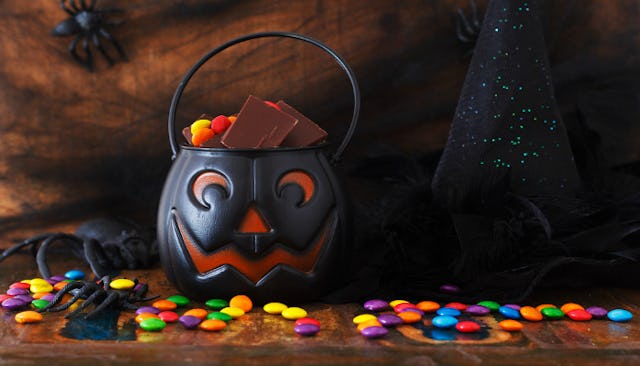Assessing The Annual Halloween Candy Tax

People say that the only sure things in life are death and taxes. As a semi-responsible mother, I feel the need to pass along that nugget of wisdom to the three little people in my house. We don’t talk about the “death” part of “death and taxes” too much, but I’m more than happy to teach them the taxation process when Halloween rolls around.
Each year at approximately 9 p.m. on the evening of October 31 after we’ve de-costumed the kids and put them to bed, my husband and I go through the kids’ Halloween candy stash. We are, ahem, searching for razor blades, heroin and poorly wrapped candy laden with anthrax that the neighbors in my safe middle class neighborhood may have passed along to children with trusting, unsuspicious parents.
Okay, okay. We’re stealing their candy. You caught us.
Eventually, the kids realize that perhaps their candy stash is diminishing faster than the one-piece-per-day rule we’ve enacted, and the husband and I must confess to our milk chocolate misdemeanors.
This is when we have the Halloween Candy Tax lecture, complete with a PowerPoint presentation and a rousing round of Candyland afterward to soften the blow.
During the HCT lecture, we tell them they don’t need to eat lots of candy because it will ruin their teeth. We tell them that our pediatric dentist gives prizes to kids who bring in their Halloween candy, and then he ships the candy off to soldiers overseas. We tell them about being healthy and how the candy is empty calories, blah, blah, blah.
And then we get real.
We tell the kids that people who enjoy privileges must also pay taxes. As citizens who enjoy privileges, our family pays taxes to our local, state and federal government. As citizens of our family, our kids enjoy the privileges of living in our house: food, clothes, shelter, toys and awesome parents. Those privileges come with a price, and sometimes that price is chocolate. Hey, they’re learning an important lesson about taxes. We’ve gotta teach this stuff early.
We also reserve the right to enact a “sin” tax on our children’s candy. Just like the government charges a higher tax rate for alcohol and tobacco, Mom and Dad get a little extra sugar when the kids demonstrate any less-than-stellar behavior. A Target tantrum? That’ll be two Tootsie rolls, thanks. Your bedroom looks like the aftermath of a hurricane? It’ll cost you a Kit Kat. Wow, you left your sippy cup of milk in my car for three weeks and now it smells like something has died in here? That will cost you everything you earned on Oak Street, kid.
As parents, we do a lot for our children. We cook for them, clean their little bodies and their bedrooms, teach them manners and social skills, help with their homework, volunteer at their schools, drive them to soccer, and love them. Oh, how we love them. We don’t ask for much in return—hugs, kisses, listening to us, cleaning their rooms, making it to the potty, trying to avoid the emergency room.
Sometimes our kids succeed and life is good, and sometimes they need to pay the Pied Piper some mini-Snickers bars to make up for that smart mouth. I’m good with that and happy to assess the annual Halloween candy tax any time.
This article was originally published on